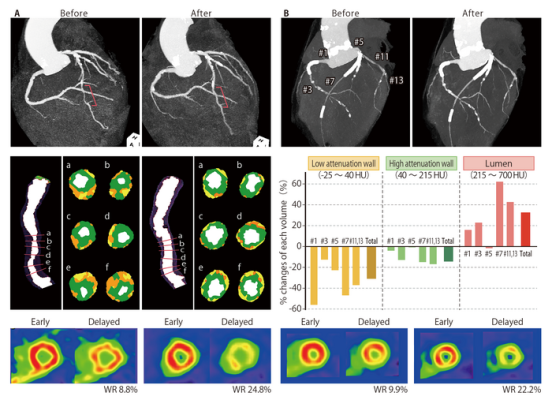
TGCV is an emerging cardiovascular disorder characterized by diffuse narrowing coronary atherosclerosis with triglyceride (TG) deposition caused by defective intracellular lipolysis. TGCV is an often-undiagnosed condition in patients who are resistant to standard therapies. Panels A and B concern two patients in their 60s with refractory angina pectoris and diabetes mellitus. After being diagnosed with TGCV, they started dietary intake of tricaprin. Their symptoms improved within a couple of months. Follow-up coronary computed tomography angiography showed marked regression of atherosclerotic lesions with luminal dilatation (left coronary artery shown as red line in upper panel A; right and left coronary arteries in upper panel B). The low-attenuation area observed from the adventitial side (yellow and orange area, in the middle, panel A) and its volume (yellow bars in the middle, panel B) were reduced, indicating ameliorated lipid involvement. These observations were associated with increased myocardial lipolysis on iodine-123-β-methyl-p-iodophenylpentadecanoic acid scintigraphy (lower panels). Image courtesy of 2022, Ken-ichi Hirano, Remarkable regression of diffuse coronary atherosclerosis in patients with triglyceride deposit cardiomyovasculopathy., European Heart Journal
January 9, 2023 — When we were little, our parents told us to take our vitamins so we could grow big and strong. Now, researchers from Japan find that one particular supplement may even fix a broken heart.
In a study that published recently in European Heart Journal, researchers from Osaka University have revealed that a dietary supplement can dramatically reverse the signs of heart disease in a subset of patients.
Coronary artery disease (CAD), which involves narrowing or even closing of the arteries of the heart and often leads to heart attack, is a major cause of death worldwide. Despite the existence of treatments such as cholesterol-lowering drugs and drug-eluting stents—a new stent technology for local drug delivery—death from this condition is still common, and some patients appear to be resistant to treatment.
“Almost 15 years ago we identified a new type of CAD called triglyceride deposit cardiomyovasculopathy (TGCV), in which the coronary arteries are occluded by triglyceride deposits generated by defective intracellular breakdown of triglycerides in vascular smooth muscle cells,” says lead author of the study Ken-ichi Hirano. “This mechanism makes TGCV distinct from classic cholesterol-induced atherosclerosis, and accounts for patients who are resistant to standard remedies for CAD.”
The researchers had developed diagnostic criteria for TGCV, and shown that this condition is especially prevalent in patients with diabetes mellitus and those who have undergone hemodialysis. Despite the ability to diagnose this condition, however, an effective treatment for these patients remained elusive.
“Now we report a remarkable regression of diffuse coronary atherosclerosis in two patients with TGCV,” states Ken-ichi Hirano. “Both had suffered from refractory chest pain and diabetes until diagnosis with TGCV, and subsequent dietary intake of tricaprin led to symptom relief.”
Tricaprin is a commercially available food supplement that promotes lipid breakdown by heart muscle cells. In addition to relieving these patients’ troublesome and painful symptoms, tricaprin also resulted in remarkable regression of the triglyceride build-up in the blood vessels of the heart.
“While atherosclerosis regression following decreased serum lipid levels is well-described, this is the first report of regression due to increased triglyceride lipolysis within cells, and as such is a conceptually novel treatment for coronary atherosclerosis,” says Ken-ichi Hirano.
Given that not all patients respond to current treatments for CAD, the findings from this study pave the way toward establishing a multi-faceted approach to CAD treatment. The dramatic results achieved by administering a readily available dietary supplement hold promise for patients who would otherwise continue to suffer the debilitating effects of this disease.
For more information: https://www.osaka-u.ac.jp/en


 February 03, 2026
February 03, 2026 









